BM634 Research: Brexit's Impact on Staff Recruitment in the NHS
VerifiedAdded on 2023/06/12
|53
|17169
|248
Report
AI Summary
This report examines the impact of Brexit on the UK healthcare industry, specifically focusing on staff recruitment, retention, motivation, and job satisfaction within the NHS. The research employs both qualitative and quantitative methods, including a questionnaire distributed to healthcare professionals. Key findings highlight the challenges faced by the NHS due to Brexit, including difficulties in recruiting and retaining staff, skill shortages, and overall uncertainty within the healthcare sector. The report also explores strategies used by the UK healthcare industry to mitigate the negative impacts of Brexit, such as improving recruitment processes and focusing on employee compensation. Ultimately, the research aims to provide insights and recommendations for healthcare organizations to address the challenges posed by Brexit and improve employee satisfaction and organizational efficiency. Desklib provides students with access to this report along with a wide array of study tools.
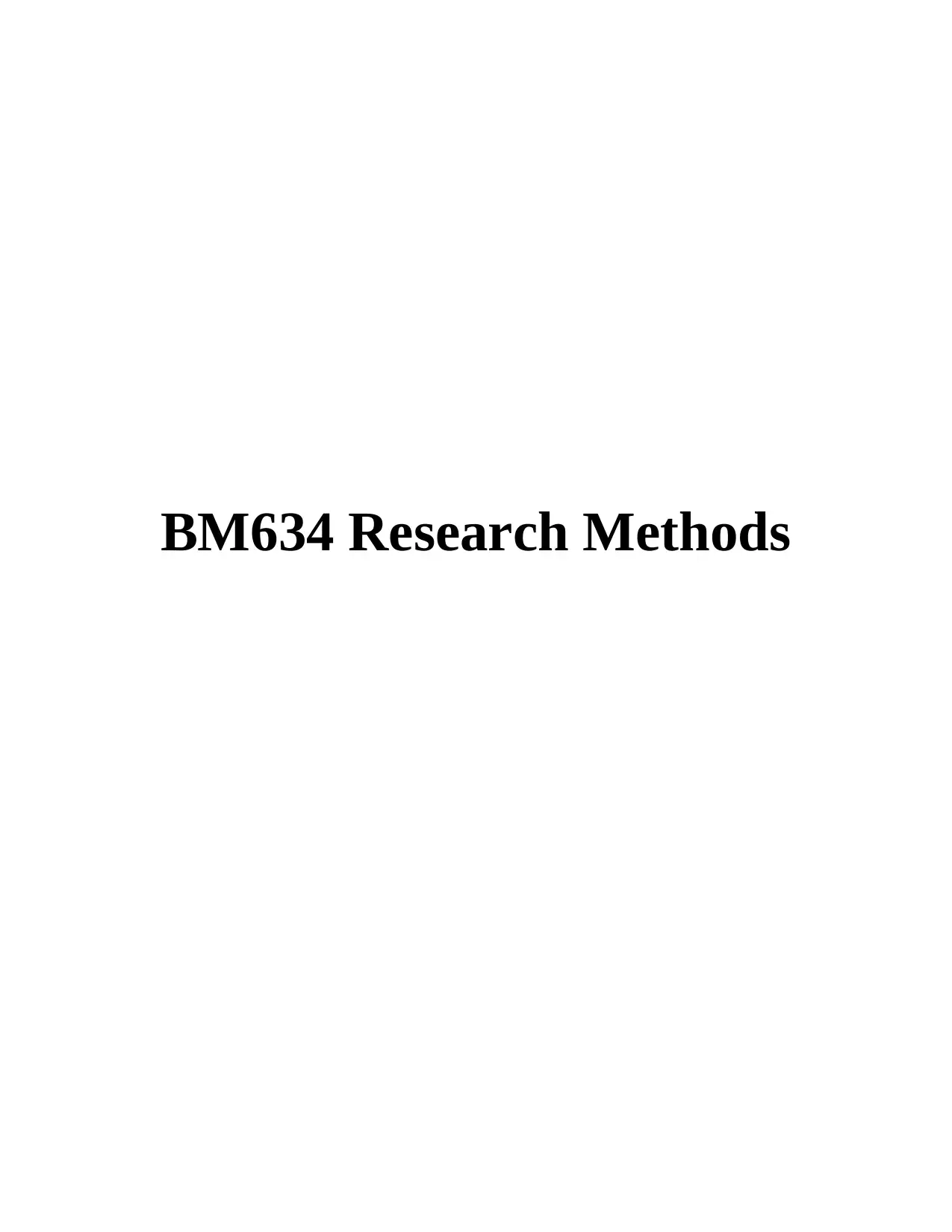
BM634 Research Methods
Paraphrase This Document
Need a fresh take? Get an instant paraphrase of this document with our AI Paraphraser
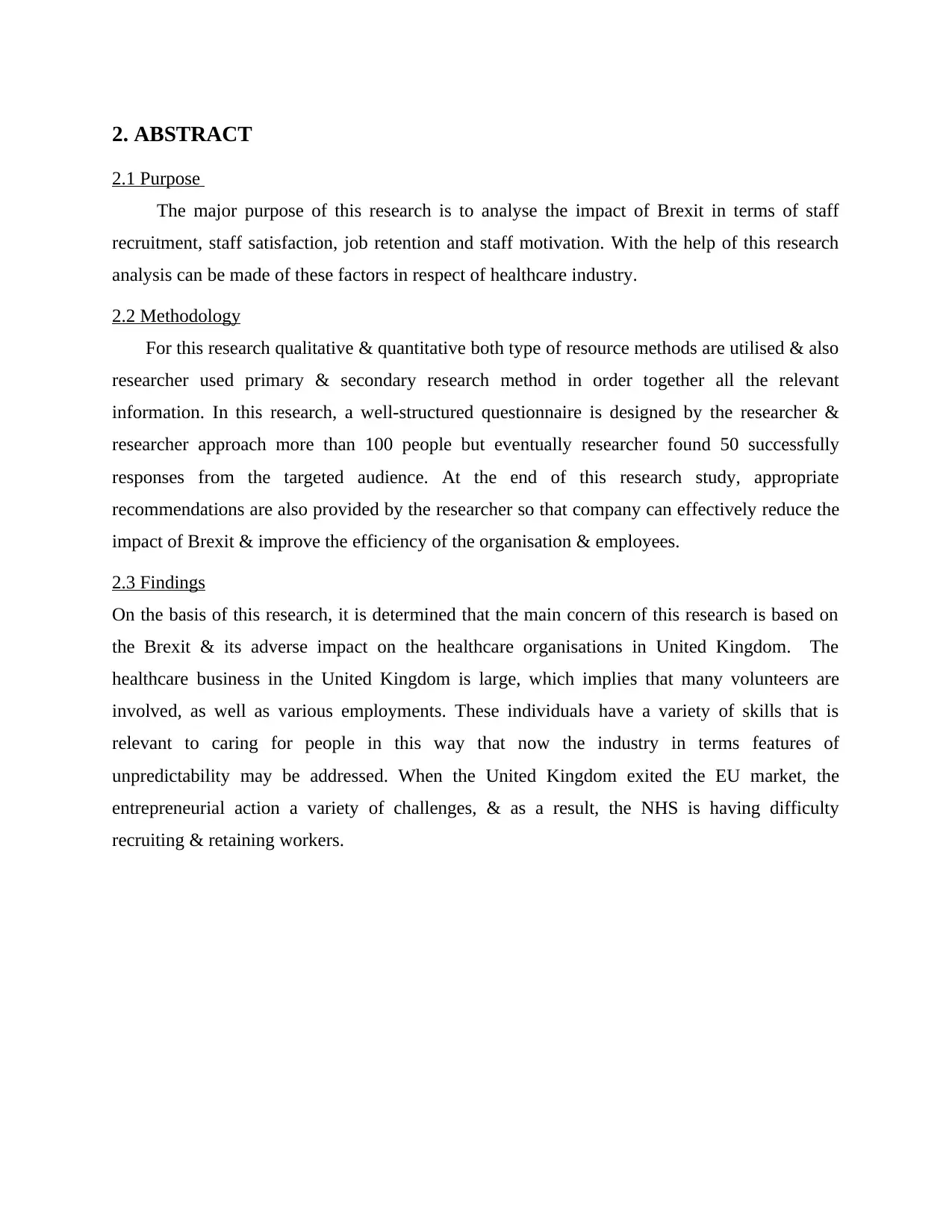
2. ABSTRACT
2.1 Purpose
The major purpose of this research is to analyse the impact of Brexit in terms of staff
recruitment, staff satisfaction, job retention and staff motivation. With the help of this research
analysis can be made of these factors in respect of healthcare industry.
2.2 Methodology
For this research qualitative & quantitative both type of resource methods are utilised & also
researcher used primary & secondary research method in order together all the relevant
information. In this research, a well-structured questionnaire is designed by the researcher &
researcher approach more than 100 people but eventually researcher found 50 successfully
responses from the targeted audience. At the end of this research study, appropriate
recommendations are also provided by the researcher so that company can effectively reduce the
impact of Brexit & improve the efficiency of the organisation & employees.
2.3 Findings
On the basis of this research, it is determined that the main concern of this research is based on
the Brexit & its adverse impact on the healthcare organisations in United Kingdom. The
healthcare business in the United Kingdom is large, which implies that many volunteers are
involved, as well as various employments. These individuals have a variety of skills that is
relevant to caring for people in this way that now the industry in terms features of
unpredictability may be addressed. When the United Kingdom exited the EU market, the
entrepreneurial action a variety of challenges, & as a result, the NHS is having difficulty
recruiting & retaining workers.
2.1 Purpose
The major purpose of this research is to analyse the impact of Brexit in terms of staff
recruitment, staff satisfaction, job retention and staff motivation. With the help of this research
analysis can be made of these factors in respect of healthcare industry.
2.2 Methodology
For this research qualitative & quantitative both type of resource methods are utilised & also
researcher used primary & secondary research method in order together all the relevant
information. In this research, a well-structured questionnaire is designed by the researcher &
researcher approach more than 100 people but eventually researcher found 50 successfully
responses from the targeted audience. At the end of this research study, appropriate
recommendations are also provided by the researcher so that company can effectively reduce the
impact of Brexit & improve the efficiency of the organisation & employees.
2.3 Findings
On the basis of this research, it is determined that the main concern of this research is based on
the Brexit & its adverse impact on the healthcare organisations in United Kingdom. The
healthcare business in the United Kingdom is large, which implies that many volunteers are
involved, as well as various employments. These individuals have a variety of skills that is
relevant to caring for people in this way that now the industry in terms features of
unpredictability may be addressed. When the United Kingdom exited the EU market, the
entrepreneurial action a variety of challenges, & as a result, the NHS is having difficulty
recruiting & retaining workers.
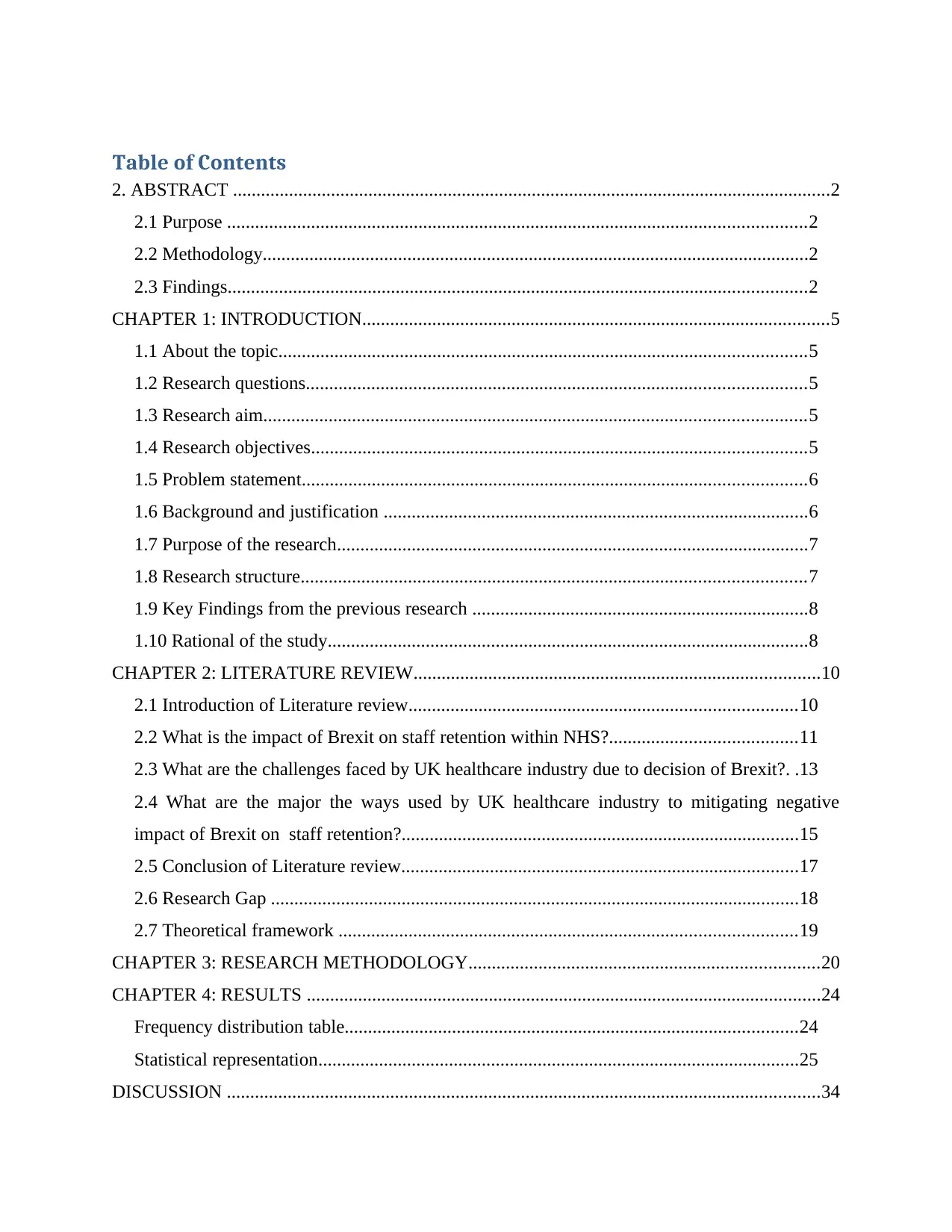
Table of Contents
2. ABSTRACT ................................................................................................................................2
2.1 Purpose ............................................................................................................................2
2.2 Methodology.....................................................................................................................2
2.3 Findings............................................................................................................................2
CHAPTER 1: INTRODUCTION....................................................................................................5
1.1 About the topic.................................................................................................................5
1.2 Research questions...........................................................................................................5
1.3 Research aim....................................................................................................................5
1.4 Research objectives..........................................................................................................5
1.5 Problem statement............................................................................................................6
1.6 Background and justification ...........................................................................................6
1.7 Purpose of the research.....................................................................................................7
1.8 Research structure............................................................................................................7
1.9 Key Findings from the previous research ........................................................................8
1.10 Rational of the study.......................................................................................................8
CHAPTER 2: LITERATURE REVIEW.......................................................................................10
2.1 Introduction of Literature review...................................................................................10
2.2 What is the impact of Brexit on staff retention within NHS?........................................11
2.3 What are the challenges faced by UK healthcare industry due to decision of Brexit?. .13
2.4 What are the major the ways used by UK healthcare industry to mitigating negative
impact of Brexit on staff retention?.....................................................................................15
2.5 Conclusion of Literature review.....................................................................................17
2.6 Research Gap .................................................................................................................18
2.7 Theoretical framework ..................................................................................................19
CHAPTER 3: RESEARCH METHODOLOGY...........................................................................20
CHAPTER 4: RESULTS ..............................................................................................................24
Frequency distribution table.................................................................................................24
Statistical representation.......................................................................................................25
DISCUSSION ...............................................................................................................................34
2. ABSTRACT ................................................................................................................................2
2.1 Purpose ............................................................................................................................2
2.2 Methodology.....................................................................................................................2
2.3 Findings............................................................................................................................2
CHAPTER 1: INTRODUCTION....................................................................................................5
1.1 About the topic.................................................................................................................5
1.2 Research questions...........................................................................................................5
1.3 Research aim....................................................................................................................5
1.4 Research objectives..........................................................................................................5
1.5 Problem statement............................................................................................................6
1.6 Background and justification ...........................................................................................6
1.7 Purpose of the research.....................................................................................................7
1.8 Research structure............................................................................................................7
1.9 Key Findings from the previous research ........................................................................8
1.10 Rational of the study.......................................................................................................8
CHAPTER 2: LITERATURE REVIEW.......................................................................................10
2.1 Introduction of Literature review...................................................................................10
2.2 What is the impact of Brexit on staff retention within NHS?........................................11
2.3 What are the challenges faced by UK healthcare industry due to decision of Brexit?. .13
2.4 What are the major the ways used by UK healthcare industry to mitigating negative
impact of Brexit on staff retention?.....................................................................................15
2.5 Conclusion of Literature review.....................................................................................17
2.6 Research Gap .................................................................................................................18
2.7 Theoretical framework ..................................................................................................19
CHAPTER 3: RESEARCH METHODOLOGY...........................................................................20
CHAPTER 4: RESULTS ..............................................................................................................24
Frequency distribution table.................................................................................................24
Statistical representation.......................................................................................................25
DISCUSSION ...............................................................................................................................34
⊘ This is a preview!⊘
Do you want full access?
Subscribe today to unlock all pages.

Trusted by 1+ million students worldwide
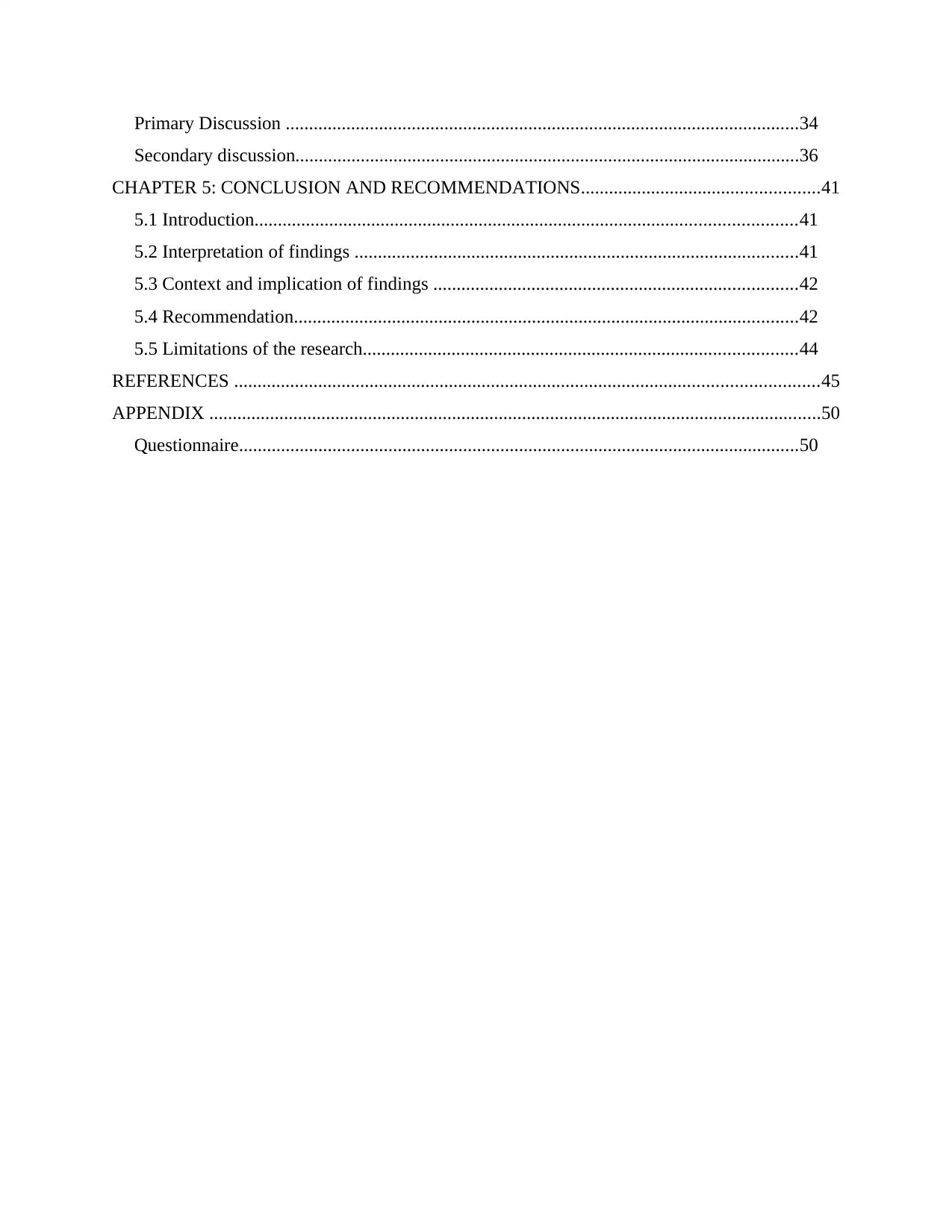
Primary Discussion ..............................................................................................................34
Secondary discussion............................................................................................................36
CHAPTER 5: CONCLUSION AND RECOMMENDATIONS...................................................41
5.1 Introduction....................................................................................................................41
5.2 Interpretation of findings ...............................................................................................41
5.3 Context and implication of findings ..............................................................................42
5.4 Recommendation............................................................................................................42
5.5 Limitations of the research.............................................................................................44
REFERENCES .............................................................................................................................45
APPENDIX ...................................................................................................................................50
Questionnaire........................................................................................................................50
Secondary discussion............................................................................................................36
CHAPTER 5: CONCLUSION AND RECOMMENDATIONS...................................................41
5.1 Introduction....................................................................................................................41
5.2 Interpretation of findings ...............................................................................................41
5.3 Context and implication of findings ..............................................................................42
5.4 Recommendation............................................................................................................42
5.5 Limitations of the research.............................................................................................44
REFERENCES .............................................................................................................................45
APPENDIX ...................................................................................................................................50
Questionnaire........................................................................................................................50
Paraphrase This Document
Need a fresh take? Get an instant paraphrase of this document with our AI Paraphraser
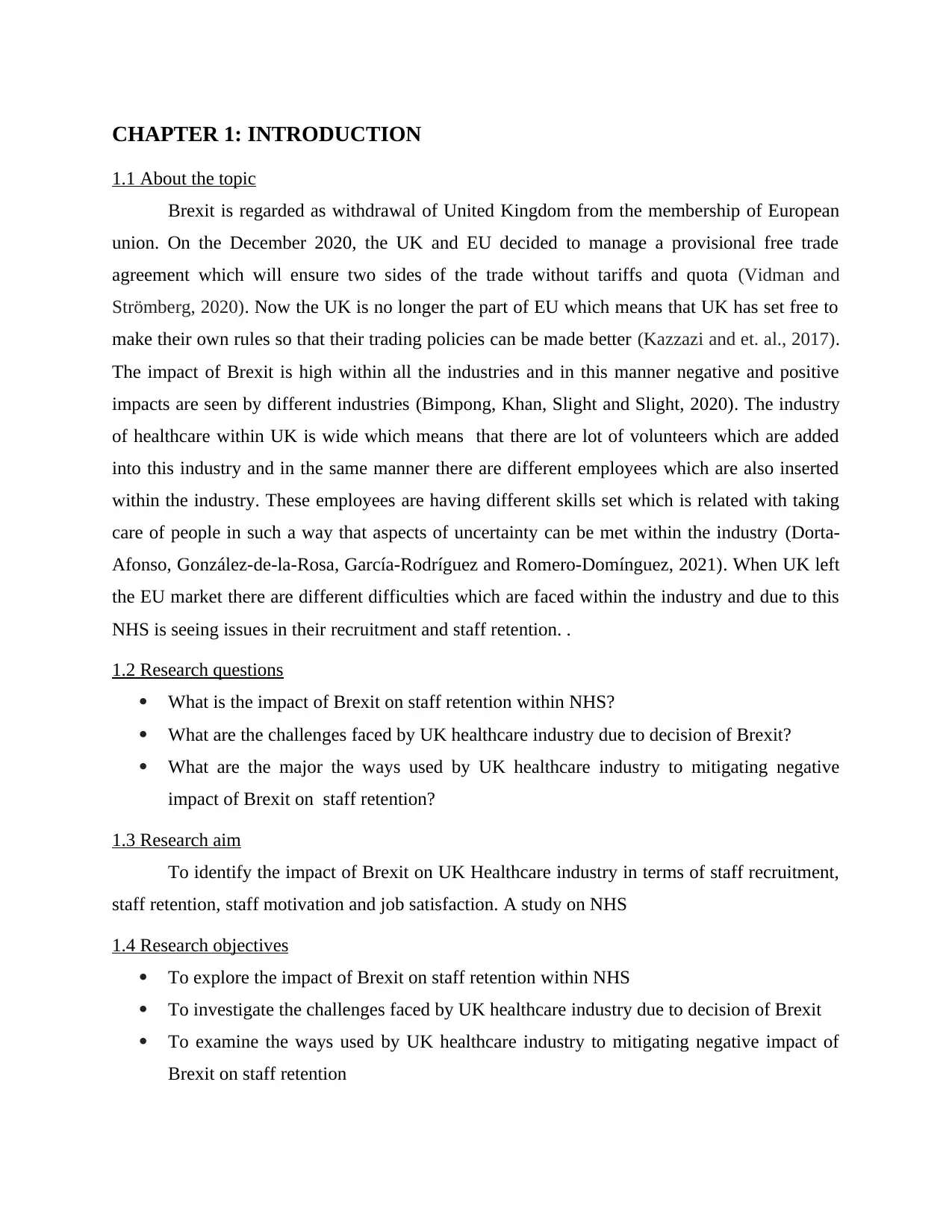
CHAPTER 1: INTRODUCTION
1.1 About the topic
Brexit is regarded as withdrawal of United Kingdom from the membership of European
union. On the December 2020, the UK and EU decided to manage a provisional free trade
agreement which will ensure two sides of the trade without tariffs and quota (Vidman and
Strömberg, 2020). Now the UK is no longer the part of EU which means that UK has set free to
make their own rules so that their trading policies can be made better (Kazzazi and et. al., 2017).
The impact of Brexit is high within all the industries and in this manner negative and positive
impacts are seen by different industries (Bimpong, Khan, Slight and Slight, 2020). The industry
of healthcare within UK is wide which means that there are lot of volunteers which are added
into this industry and in the same manner there are different employees which are also inserted
within the industry. These employees are having different skills set which is related with taking
care of people in such a way that aspects of uncertainty can be met within the industry (Dorta-
Afonso, González-de-la-Rosa, García-Rodríguez and Romero-Domínguez, 2021). When UK left
the EU market there are different difficulties which are faced within the industry and due to this
NHS is seeing issues in their recruitment and staff retention. .
1.2 Research questions
What is the impact of Brexit on staff retention within NHS?
What are the challenges faced by UK healthcare industry due to decision of Brexit?
What are the major the ways used by UK healthcare industry to mitigating negative
impact of Brexit on staff retention?
1.3 Research aim
To identify the impact of Brexit on UK Healthcare industry in terms of staff recruitment,
staff retention, staff motivation and job satisfaction. A study on NHS
1.4 Research objectives
To explore the impact of Brexit on staff retention within NHS
To investigate the challenges faced by UK healthcare industry due to decision of Brexit
To examine the ways used by UK healthcare industry to mitigating negative impact of
Brexit on staff retention
1.1 About the topic
Brexit is regarded as withdrawal of United Kingdom from the membership of European
union. On the December 2020, the UK and EU decided to manage a provisional free trade
agreement which will ensure two sides of the trade without tariffs and quota (Vidman and
Strömberg, 2020). Now the UK is no longer the part of EU which means that UK has set free to
make their own rules so that their trading policies can be made better (Kazzazi and et. al., 2017).
The impact of Brexit is high within all the industries and in this manner negative and positive
impacts are seen by different industries (Bimpong, Khan, Slight and Slight, 2020). The industry
of healthcare within UK is wide which means that there are lot of volunteers which are added
into this industry and in the same manner there are different employees which are also inserted
within the industry. These employees are having different skills set which is related with taking
care of people in such a way that aspects of uncertainty can be met within the industry (Dorta-
Afonso, González-de-la-Rosa, García-Rodríguez and Romero-Domínguez, 2021). When UK left
the EU market there are different difficulties which are faced within the industry and due to this
NHS is seeing issues in their recruitment and staff retention. .
1.2 Research questions
What is the impact of Brexit on staff retention within NHS?
What are the challenges faced by UK healthcare industry due to decision of Brexit?
What are the major the ways used by UK healthcare industry to mitigating negative
impact of Brexit on staff retention?
1.3 Research aim
To identify the impact of Brexit on UK Healthcare industry in terms of staff recruitment,
staff retention, staff motivation and job satisfaction. A study on NHS
1.4 Research objectives
To explore the impact of Brexit on staff retention within NHS
To investigate the challenges faced by UK healthcare industry due to decision of Brexit
To examine the ways used by UK healthcare industry to mitigating negative impact of
Brexit on staff retention
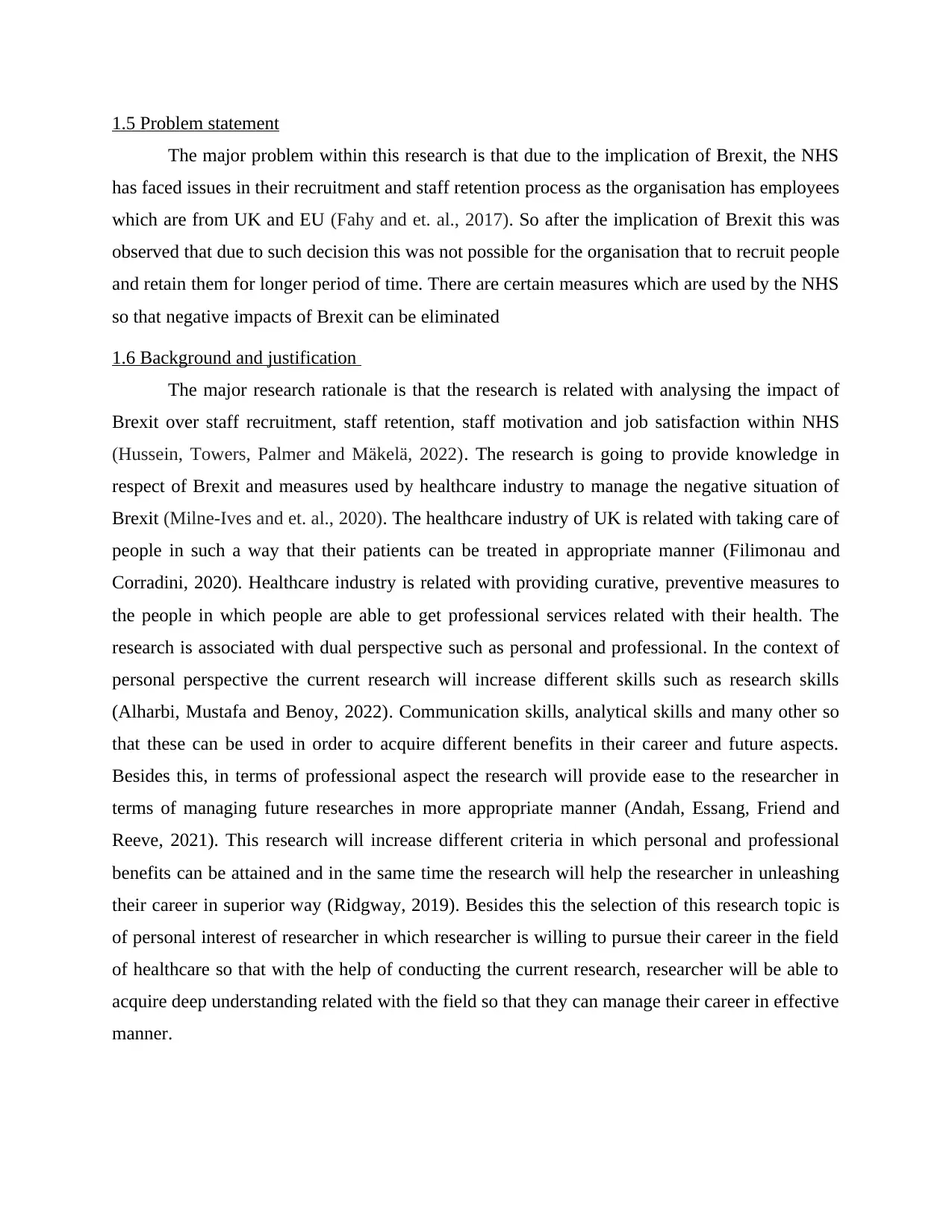
1.5 Problem statement
The major problem within this research is that due to the implication of Brexit, the NHS
has faced issues in their recruitment and staff retention process as the organisation has employees
which are from UK and EU (Fahy and et. al., 2017). So after the implication of Brexit this was
observed that due to such decision this was not possible for the organisation that to recruit people
and retain them for longer period of time. There are certain measures which are used by the NHS
so that negative impacts of Brexit can be eliminated
1.6 Background and justification
The major research rationale is that the research is related with analysing the impact of
Brexit over staff recruitment, staff retention, staff motivation and job satisfaction within NHS
(Hussein, Towers, Palmer and Mäkelä, 2022). The research is going to provide knowledge in
respect of Brexit and measures used by healthcare industry to manage the negative situation of
Brexit (Milne-Ives and et. al., 2020). The healthcare industry of UK is related with taking care of
people in such a way that their patients can be treated in appropriate manner (Filimonau and
Corradini, 2020). Healthcare industry is related with providing curative, preventive measures to
the people in which people are able to get professional services related with their health. The
research is associated with dual perspective such as personal and professional. In the context of
personal perspective the current research will increase different skills such as research skills
(Alharbi, Mustafa and Benoy, 2022). Communication skills, analytical skills and many other so
that these can be used in order to acquire different benefits in their career and future aspects.
Besides this, in terms of professional aspect the research will provide ease to the researcher in
terms of managing future researches in more appropriate manner (Andah, Essang, Friend and
Reeve, 2021). This research will increase different criteria in which personal and professional
benefits can be attained and in the same time the research will help the researcher in unleashing
their career in superior way (Ridgway, 2019). Besides this the selection of this research topic is
of personal interest of researcher in which researcher is willing to pursue their career in the field
of healthcare so that with the help of conducting the current research, researcher will be able to
acquire deep understanding related with the field so that they can manage their career in effective
manner.
The major problem within this research is that due to the implication of Brexit, the NHS
has faced issues in their recruitment and staff retention process as the organisation has employees
which are from UK and EU (Fahy and et. al., 2017). So after the implication of Brexit this was
observed that due to such decision this was not possible for the organisation that to recruit people
and retain them for longer period of time. There are certain measures which are used by the NHS
so that negative impacts of Brexit can be eliminated
1.6 Background and justification
The major research rationale is that the research is related with analysing the impact of
Brexit over staff recruitment, staff retention, staff motivation and job satisfaction within NHS
(Hussein, Towers, Palmer and Mäkelä, 2022). The research is going to provide knowledge in
respect of Brexit and measures used by healthcare industry to manage the negative situation of
Brexit (Milne-Ives and et. al., 2020). The healthcare industry of UK is related with taking care of
people in such a way that their patients can be treated in appropriate manner (Filimonau and
Corradini, 2020). Healthcare industry is related with providing curative, preventive measures to
the people in which people are able to get professional services related with their health. The
research is associated with dual perspective such as personal and professional. In the context of
personal perspective the current research will increase different skills such as research skills
(Alharbi, Mustafa and Benoy, 2022). Communication skills, analytical skills and many other so
that these can be used in order to acquire different benefits in their career and future aspects.
Besides this, in terms of professional aspect the research will provide ease to the researcher in
terms of managing future researches in more appropriate manner (Andah, Essang, Friend and
Reeve, 2021). This research will increase different criteria in which personal and professional
benefits can be attained and in the same time the research will help the researcher in unleashing
their career in superior way (Ridgway, 2019). Besides this the selection of this research topic is
of personal interest of researcher in which researcher is willing to pursue their career in the field
of healthcare so that with the help of conducting the current research, researcher will be able to
acquire deep understanding related with the field so that they can manage their career in effective
manner.
⊘ This is a preview!⊘
Do you want full access?
Subscribe today to unlock all pages.

Trusted by 1+ million students worldwide
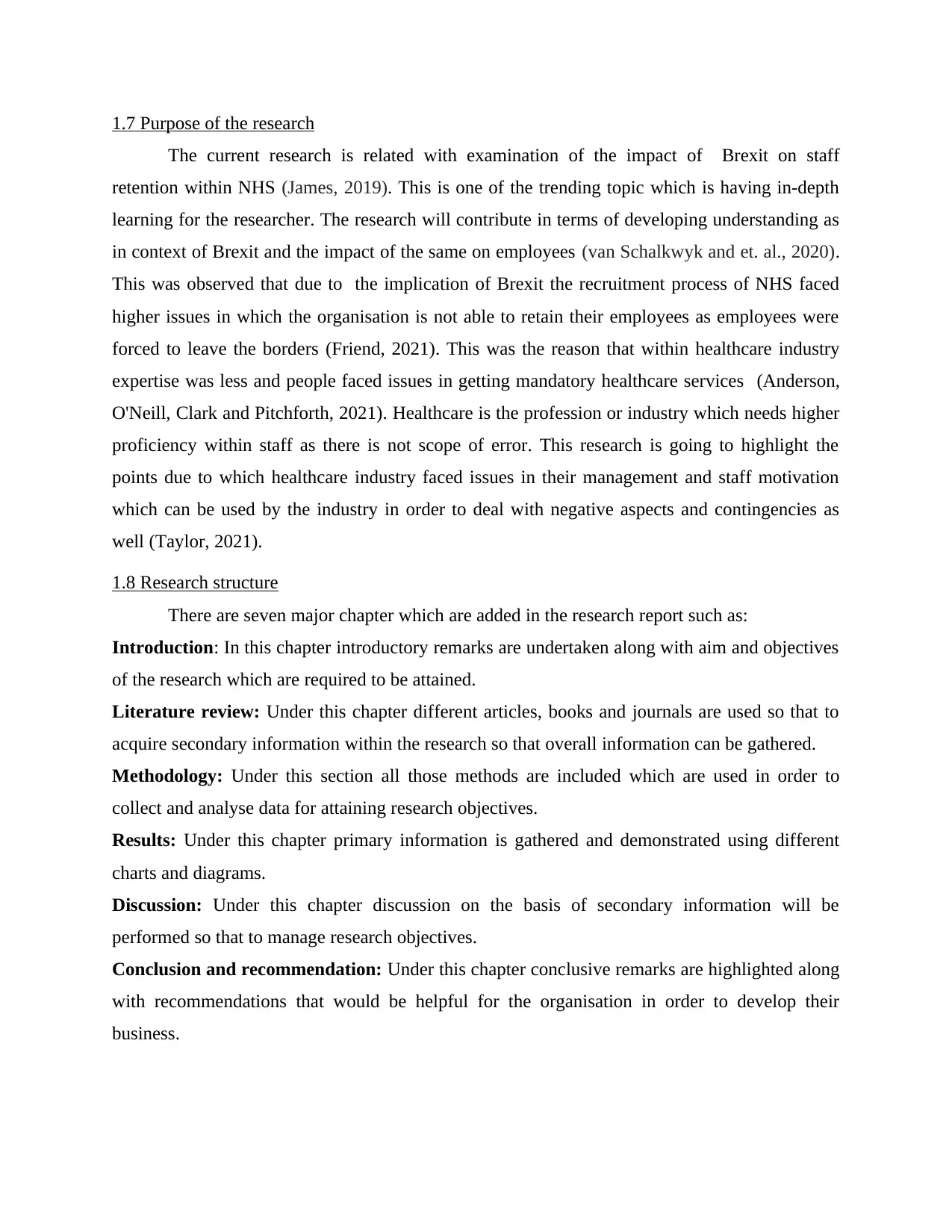
1.7 Purpose of the research
The current research is related with examination of the impact of Brexit on staff
retention within NHS (James, 2019). This is one of the trending topic which is having in-depth
learning for the researcher. The research will contribute in terms of developing understanding as
in context of Brexit and the impact of the same on employees (van Schalkwyk and et. al., 2020).
This was observed that due to the implication of Brexit the recruitment process of NHS faced
higher issues in which the organisation is not able to retain their employees as employees were
forced to leave the borders (Friend, 2021). This was the reason that within healthcare industry
expertise was less and people faced issues in getting mandatory healthcare services (Anderson,
O'Neill, Clark and Pitchforth, 2021). Healthcare is the profession or industry which needs higher
proficiency within staff as there is not scope of error. This research is going to highlight the
points due to which healthcare industry faced issues in their management and staff motivation
which can be used by the industry in order to deal with negative aspects and contingencies as
well (Taylor, 2021).
1.8 Research structure
There are seven major chapter which are added in the research report such as:
Introduction: In this chapter introductory remarks are undertaken along with aim and objectives
of the research which are required to be attained.
Literature review: Under this chapter different articles, books and journals are used so that to
acquire secondary information within the research so that overall information can be gathered.
Methodology: Under this section all those methods are included which are used in order to
collect and analyse data for attaining research objectives.
Results: Under this chapter primary information is gathered and demonstrated using different
charts and diagrams.
Discussion: Under this chapter discussion on the basis of secondary information will be
performed so that to manage research objectives.
Conclusion and recommendation: Under this chapter conclusive remarks are highlighted along
with recommendations that would be helpful for the organisation in order to develop their
business.
The current research is related with examination of the impact of Brexit on staff
retention within NHS (James, 2019). This is one of the trending topic which is having in-depth
learning for the researcher. The research will contribute in terms of developing understanding as
in context of Brexit and the impact of the same on employees (van Schalkwyk and et. al., 2020).
This was observed that due to the implication of Brexit the recruitment process of NHS faced
higher issues in which the organisation is not able to retain their employees as employees were
forced to leave the borders (Friend, 2021). This was the reason that within healthcare industry
expertise was less and people faced issues in getting mandatory healthcare services (Anderson,
O'Neill, Clark and Pitchforth, 2021). Healthcare is the profession or industry which needs higher
proficiency within staff as there is not scope of error. This research is going to highlight the
points due to which healthcare industry faced issues in their management and staff motivation
which can be used by the industry in order to deal with negative aspects and contingencies as
well (Taylor, 2021).
1.8 Research structure
There are seven major chapter which are added in the research report such as:
Introduction: In this chapter introductory remarks are undertaken along with aim and objectives
of the research which are required to be attained.
Literature review: Under this chapter different articles, books and journals are used so that to
acquire secondary information within the research so that overall information can be gathered.
Methodology: Under this section all those methods are included which are used in order to
collect and analyse data for attaining research objectives.
Results: Under this chapter primary information is gathered and demonstrated using different
charts and diagrams.
Discussion: Under this chapter discussion on the basis of secondary information will be
performed so that to manage research objectives.
Conclusion and recommendation: Under this chapter conclusive remarks are highlighted along
with recommendations that would be helpful for the organisation in order to develop their
business.
Paraphrase This Document
Need a fresh take? Get an instant paraphrase of this document with our AI Paraphraser
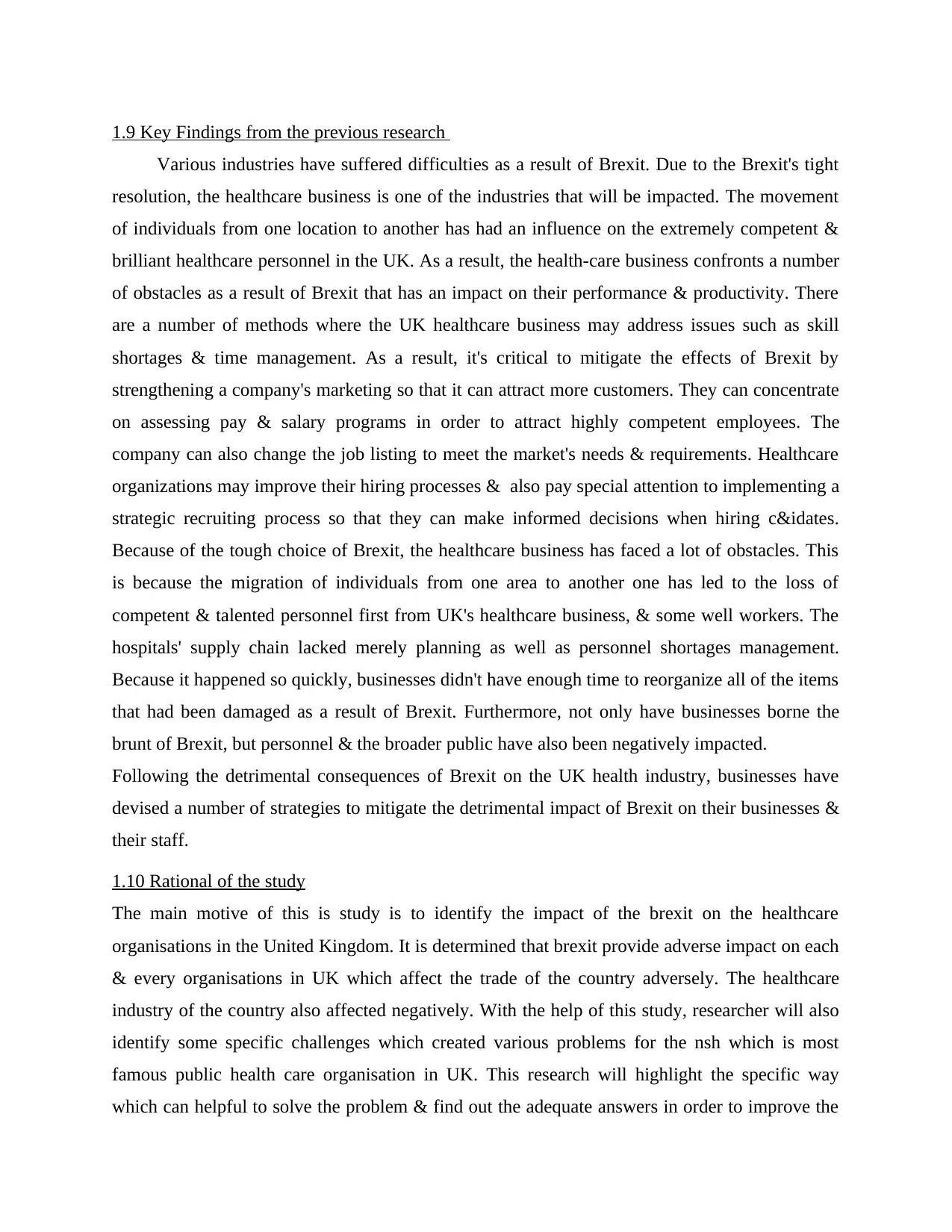
1.9 Key Findings from the previous research
Various industries have suffered difficulties as a result of Brexit. Due to the Brexit's tight
resolution, the healthcare business is one of the industries that will be impacted. The movement
of individuals from one location to another has had an influence on the extremely competent &
brilliant healthcare personnel in the UK. As a result, the health-care business confronts a number
of obstacles as a result of Brexit that has an impact on their performance & productivity. There
are a number of methods where the UK healthcare business may address issues such as skill
shortages & time management. As a result, it's critical to mitigate the effects of Brexit by
strengthening a company's marketing so that it can attract more customers. They can concentrate
on assessing pay & salary programs in order to attract highly competent employees. The
company can also change the job listing to meet the market's needs & requirements. Healthcare
organizations may improve their hiring processes & also pay special attention to implementing a
strategic recruiting process so that they can make informed decisions when hiring c&idates.
Because of the tough choice of Brexit, the healthcare business has faced a lot of obstacles. This
is because the migration of individuals from one area to another one has led to the loss of
competent & talented personnel first from UK's healthcare business, & some well workers. The
hospitals' supply chain lacked merely planning as well as personnel shortages management.
Because it happened so quickly, businesses didn't have enough time to reorganize all of the items
that had been damaged as a result of Brexit. Furthermore, not only have businesses borne the
brunt of Brexit, but personnel & the broader public have also been negatively impacted.
Following the detrimental consequences of Brexit on the UK health industry, businesses have
devised a number of strategies to mitigate the detrimental impact of Brexit on their businesses &
their staff.
1.10 Rational of the study
The main motive of this is study is to identify the impact of the brexit on the healthcare
organisations in the United Kingdom. It is determined that brexit provide adverse impact on each
& every organisations in UK which affect the trade of the country adversely. The healthcare
industry of the country also affected negatively. With the help of this study, researcher will also
identify some specific challenges which created various problems for the nsh which is most
famous public health care organisation in UK. This research will highlight the specific way
which can helpful to solve the problem & find out the adequate answers in order to improve the
Various industries have suffered difficulties as a result of Brexit. Due to the Brexit's tight
resolution, the healthcare business is one of the industries that will be impacted. The movement
of individuals from one location to another has had an influence on the extremely competent &
brilliant healthcare personnel in the UK. As a result, the health-care business confronts a number
of obstacles as a result of Brexit that has an impact on their performance & productivity. There
are a number of methods where the UK healthcare business may address issues such as skill
shortages & time management. As a result, it's critical to mitigate the effects of Brexit by
strengthening a company's marketing so that it can attract more customers. They can concentrate
on assessing pay & salary programs in order to attract highly competent employees. The
company can also change the job listing to meet the market's needs & requirements. Healthcare
organizations may improve their hiring processes & also pay special attention to implementing a
strategic recruiting process so that they can make informed decisions when hiring c&idates.
Because of the tough choice of Brexit, the healthcare business has faced a lot of obstacles. This
is because the migration of individuals from one area to another one has led to the loss of
competent & talented personnel first from UK's healthcare business, & some well workers. The
hospitals' supply chain lacked merely planning as well as personnel shortages management.
Because it happened so quickly, businesses didn't have enough time to reorganize all of the items
that had been damaged as a result of Brexit. Furthermore, not only have businesses borne the
brunt of Brexit, but personnel & the broader public have also been negatively impacted.
Following the detrimental consequences of Brexit on the UK health industry, businesses have
devised a number of strategies to mitigate the detrimental impact of Brexit on their businesses &
their staff.
1.10 Rational of the study
The main motive of this is study is to identify the impact of the brexit on the healthcare
organisations in the United Kingdom. It is determined that brexit provide adverse impact on each
& every organisations in UK which affect the trade of the country adversely. The healthcare
industry of the country also affected negatively. With the help of this study, researcher will also
identify some specific challenges which created various problems for the nsh which is most
famous public health care organisation in UK. This research will highlight the specific way
which can helpful to solve the problem & find out the adequate answers in order to improve the

employee motivation, employee satisfaction, & employee retention & recruitment process in the
organisation.
organisation.
⊘ This is a preview!⊘
Do you want full access?
Subscribe today to unlock all pages.

Trusted by 1+ million students worldwide
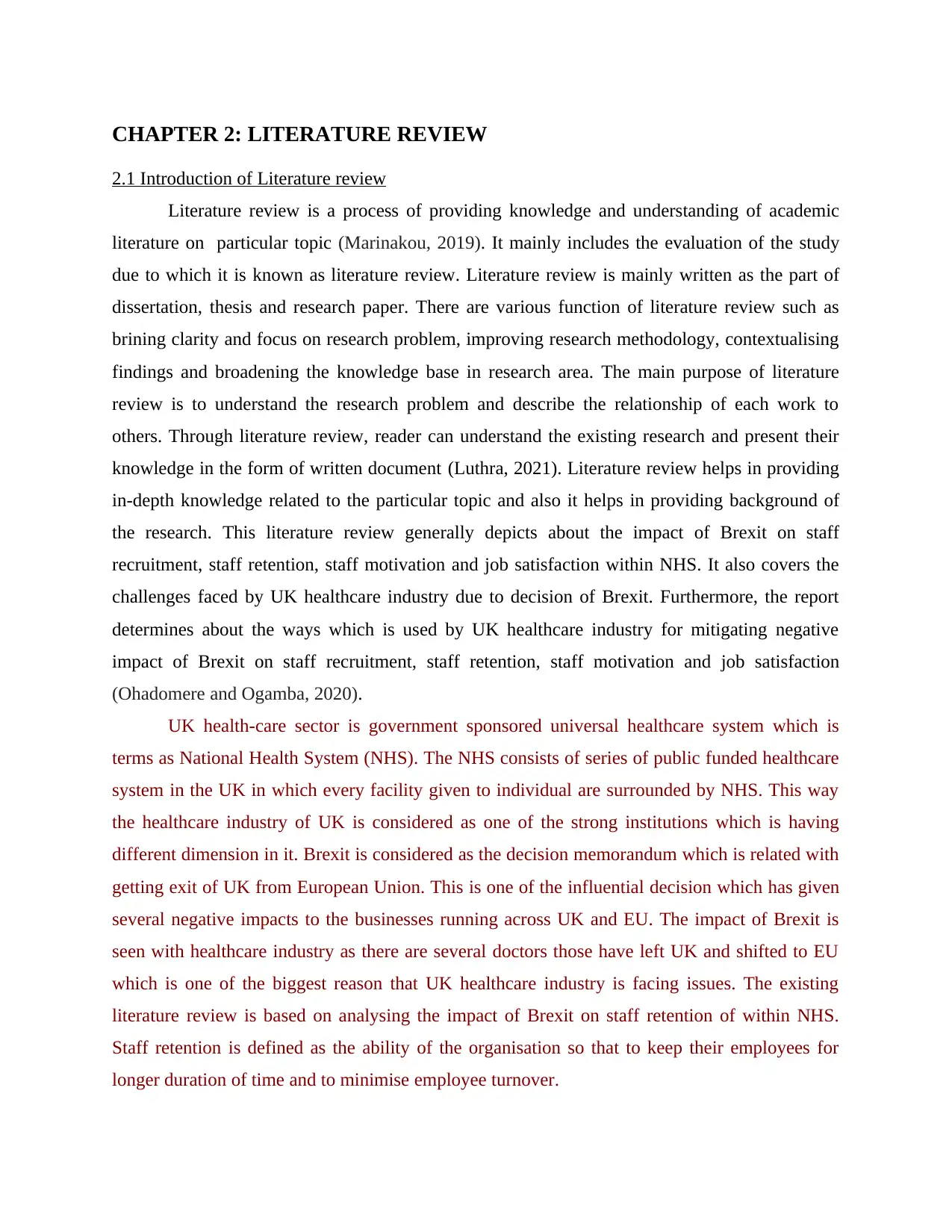
CHAPTER 2: LITERATURE REVIEW
2.1 Introduction of Literature review
Literature review is a process of providing knowledge and understanding of academic
literature on particular topic (Marinakou, 2019). It mainly includes the evaluation of the study
due to which it is known as literature review. Literature review is mainly written as the part of
dissertation, thesis and research paper. There are various function of literature review such as
brining clarity and focus on research problem, improving research methodology, contextualising
findings and broadening the knowledge base in research area. The main purpose of literature
review is to understand the research problem and describe the relationship of each work to
others. Through literature review, reader can understand the existing research and present their
knowledge in the form of written document (Luthra, 2021). Literature review helps in providing
in-depth knowledge related to the particular topic and also it helps in providing background of
the research. This literature review generally depicts about the impact of Brexit on staff
recruitment, staff retention, staff motivation and job satisfaction within NHS. It also covers the
challenges faced by UK healthcare industry due to decision of Brexit. Furthermore, the report
determines about the ways which is used by UK healthcare industry for mitigating negative
impact of Brexit on staff recruitment, staff retention, staff motivation and job satisfaction
(Ohadomere and Ogamba, 2020).
UK health-care sector is government sponsored universal healthcare system which is
terms as National Health System (NHS). The NHS consists of series of public funded healthcare
system in the UK in which every facility given to individual are surrounded by NHS. This way
the healthcare industry of UK is considered as one of the strong institutions which is having
different dimension in it. Brexit is considered as the decision memorandum which is related with
getting exit of UK from European Union. This is one of the influential decision which has given
several negative impacts to the businesses running across UK and EU. The impact of Brexit is
seen with healthcare industry as there are several doctors those have left UK and shifted to EU
which is one of the biggest reason that UK healthcare industry is facing issues. The existing
literature review is based on analysing the impact of Brexit on staff retention of within NHS.
Staff retention is defined as the ability of the organisation so that to keep their employees for
longer duration of time and to minimise employee turnover.
2.1 Introduction of Literature review
Literature review is a process of providing knowledge and understanding of academic
literature on particular topic (Marinakou, 2019). It mainly includes the evaluation of the study
due to which it is known as literature review. Literature review is mainly written as the part of
dissertation, thesis and research paper. There are various function of literature review such as
brining clarity and focus on research problem, improving research methodology, contextualising
findings and broadening the knowledge base in research area. The main purpose of literature
review is to understand the research problem and describe the relationship of each work to
others. Through literature review, reader can understand the existing research and present their
knowledge in the form of written document (Luthra, 2021). Literature review helps in providing
in-depth knowledge related to the particular topic and also it helps in providing background of
the research. This literature review generally depicts about the impact of Brexit on staff
recruitment, staff retention, staff motivation and job satisfaction within NHS. It also covers the
challenges faced by UK healthcare industry due to decision of Brexit. Furthermore, the report
determines about the ways which is used by UK healthcare industry for mitigating negative
impact of Brexit on staff recruitment, staff retention, staff motivation and job satisfaction
(Ohadomere and Ogamba, 2020).
UK health-care sector is government sponsored universal healthcare system which is
terms as National Health System (NHS). The NHS consists of series of public funded healthcare
system in the UK in which every facility given to individual are surrounded by NHS. This way
the healthcare industry of UK is considered as one of the strong institutions which is having
different dimension in it. Brexit is considered as the decision memorandum which is related with
getting exit of UK from European Union. This is one of the influential decision which has given
several negative impacts to the businesses running across UK and EU. The impact of Brexit is
seen with healthcare industry as there are several doctors those have left UK and shifted to EU
which is one of the biggest reason that UK healthcare industry is facing issues. The existing
literature review is based on analysing the impact of Brexit on staff retention of within NHS.
Staff retention is defined as the ability of the organisation so that to keep their employees for
longer duration of time and to minimise employee turnover.
Paraphrase This Document
Need a fresh take? Get an instant paraphrase of this document with our AI Paraphraser
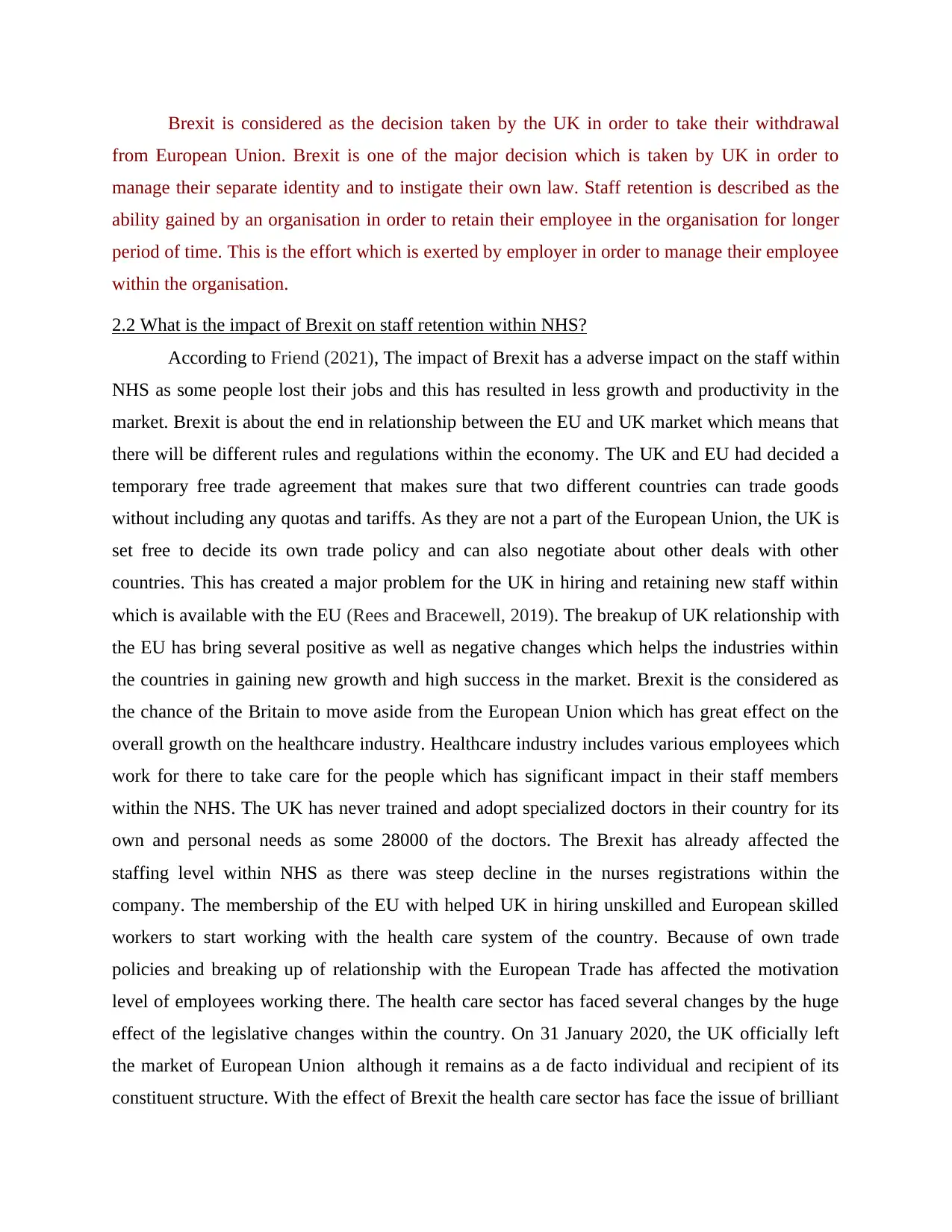
Brexit is considered as the decision taken by the UK in order to take their withdrawal
from European Union. Brexit is one of the major decision which is taken by UK in order to
manage their separate identity and to instigate their own law. Staff retention is described as the
ability gained by an organisation in order to retain their employee in the organisation for longer
period of time. This is the effort which is exerted by employer in order to manage their employee
within the organisation.
2.2 What is the impact of Brexit on staff retention within NHS?
According to Friend (2021), The impact of Brexit has a adverse impact on the staff within
NHS as some people lost their jobs and this has resulted in less growth and productivity in the
market. Brexit is about the end in relationship between the EU and UK market which means that
there will be different rules and regulations within the economy. The UK and EU had decided a
temporary free trade agreement that makes sure that two different countries can trade goods
without including any quotas and tariffs. As they are not a part of the European Union, the UK is
set free to decide its own trade policy and can also negotiate about other deals with other
countries. This has created a major problem for the UK in hiring and retaining new staff within
which is available with the EU (Rees and Bracewell, 2019). The breakup of UK relationship with
the EU has bring several positive as well as negative changes which helps the industries within
the countries in gaining new growth and high success in the market. Brexit is the considered as
the chance of the Britain to move aside from the European Union which has great effect on the
overall growth on the healthcare industry. Healthcare industry includes various employees which
work for there to take care for the people which has significant impact in their staff members
within the NHS. The UK has never trained and adopt specialized doctors in their country for its
own and personal needs as some 28000 of the doctors. The Brexit has already affected the
staffing level within NHS as there was steep decline in the nurses registrations within the
company. The membership of the EU with helped UK in hiring unskilled and European skilled
workers to start working with the health care system of the country. Because of own trade
policies and breaking up of relationship with the European Trade has affected the motivation
level of employees working there. The health care sector has faced several changes by the huge
effect of the legislative changes within the country. On 31 January 2020, the UK officially left
the market of European Union although it remains as a de facto individual and recipient of its
constituent structure. With the effect of Brexit the health care sector has face the issue of brilliant
from European Union. Brexit is one of the major decision which is taken by UK in order to
manage their separate identity and to instigate their own law. Staff retention is described as the
ability gained by an organisation in order to retain their employee in the organisation for longer
period of time. This is the effort which is exerted by employer in order to manage their employee
within the organisation.
2.2 What is the impact of Brexit on staff retention within NHS?
According to Friend (2021), The impact of Brexit has a adverse impact on the staff within
NHS as some people lost their jobs and this has resulted in less growth and productivity in the
market. Brexit is about the end in relationship between the EU and UK market which means that
there will be different rules and regulations within the economy. The UK and EU had decided a
temporary free trade agreement that makes sure that two different countries can trade goods
without including any quotas and tariffs. As they are not a part of the European Union, the UK is
set free to decide its own trade policy and can also negotiate about other deals with other
countries. This has created a major problem for the UK in hiring and retaining new staff within
which is available with the EU (Rees and Bracewell, 2019). The breakup of UK relationship with
the EU has bring several positive as well as negative changes which helps the industries within
the countries in gaining new growth and high success in the market. Brexit is the considered as
the chance of the Britain to move aside from the European Union which has great effect on the
overall growth on the healthcare industry. Healthcare industry includes various employees which
work for there to take care for the people which has significant impact in their staff members
within the NHS. The UK has never trained and adopt specialized doctors in their country for its
own and personal needs as some 28000 of the doctors. The Brexit has already affected the
staffing level within NHS as there was steep decline in the nurses registrations within the
company. The membership of the EU with helped UK in hiring unskilled and European skilled
workers to start working with the health care system of the country. Because of own trade
policies and breaking up of relationship with the European Trade has affected the motivation
level of employees working there. The health care sector has faced several changes by the huge
effect of the legislative changes within the country. On 31 January 2020, the UK officially left
the market of European Union although it remains as a de facto individual and recipient of its
constituent structure. With the effect of Brexit the health care sector has face the issue of brilliant
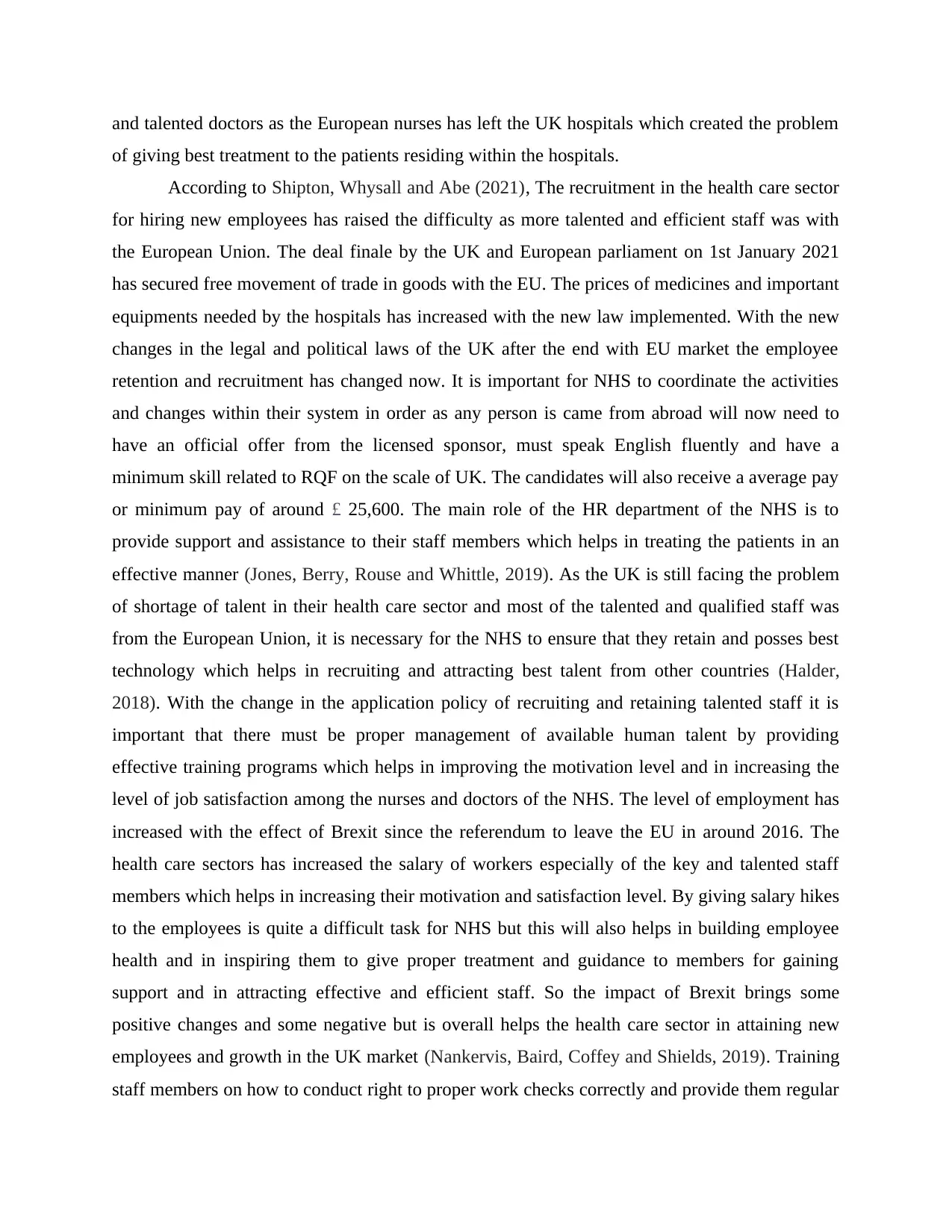
and talented doctors as the European nurses has left the UK hospitals which created the problem
of giving best treatment to the patients residing within the hospitals.
According to Shipton, Whysall and Abe (2021), The recruitment in the health care sector
for hiring new employees has raised the difficulty as more talented and efficient staff was with
the European Union. The deal finale by the UK and European parliament on 1st January 2021
has secured free movement of trade in goods with the EU. The prices of medicines and important
equipments needed by the hospitals has increased with the new law implemented. With the new
changes in the legal and political laws of the UK after the end with EU market the employee
retention and recruitment has changed now. It is important for NHS to coordinate the activities
and changes within their system in order as any person is came from abroad will now need to
have an official offer from the licensed sponsor, must speak English fluently and have a
minimum skill related to RQF on the scale of UK. The candidates will also receive a average pay
or minimum pay of around £ 25,600. The main role of the HR department of the NHS is to
provide support and assistance to their staff members which helps in treating the patients in an
effective manner (Jones, Berry, Rouse and Whittle, 2019). As the UK is still facing the problem
of shortage of talent in their health care sector and most of the talented and qualified staff was
from the European Union, it is necessary for the NHS to ensure that they retain and posses best
technology which helps in recruiting and attracting best talent from other countries (Halder,
2018). With the change in the application policy of recruiting and retaining talented staff it is
important that there must be proper management of available human talent by providing
effective training programs which helps in improving the motivation level and in increasing the
level of job satisfaction among the nurses and doctors of the NHS. The level of employment has
increased with the effect of Brexit since the referendum to leave the EU in around 2016. The
health care sectors has increased the salary of workers especially of the key and talented staff
members which helps in increasing their motivation and satisfaction level. By giving salary hikes
to the employees is quite a difficult task for NHS but this will also helps in building employee
health and in inspiring them to give proper treatment and guidance to members for gaining
support and in attracting effective and efficient staff. So the impact of Brexit brings some
positive changes and some negative but is overall helps the health care sector in attaining new
employees and growth in the UK market (Nankervis, Baird, Coffey and Shields, 2019). Training
staff members on how to conduct right to proper work checks correctly and provide them regular
of giving best treatment to the patients residing within the hospitals.
According to Shipton, Whysall and Abe (2021), The recruitment in the health care sector
for hiring new employees has raised the difficulty as more talented and efficient staff was with
the European Union. The deal finale by the UK and European parliament on 1st January 2021
has secured free movement of trade in goods with the EU. The prices of medicines and important
equipments needed by the hospitals has increased with the new law implemented. With the new
changes in the legal and political laws of the UK after the end with EU market the employee
retention and recruitment has changed now. It is important for NHS to coordinate the activities
and changes within their system in order as any person is came from abroad will now need to
have an official offer from the licensed sponsor, must speak English fluently and have a
minimum skill related to RQF on the scale of UK. The candidates will also receive a average pay
or minimum pay of around £ 25,600. The main role of the HR department of the NHS is to
provide support and assistance to their staff members which helps in treating the patients in an
effective manner (Jones, Berry, Rouse and Whittle, 2019). As the UK is still facing the problem
of shortage of talent in their health care sector and most of the talented and qualified staff was
from the European Union, it is necessary for the NHS to ensure that they retain and posses best
technology which helps in recruiting and attracting best talent from other countries (Halder,
2018). With the change in the application policy of recruiting and retaining talented staff it is
important that there must be proper management of available human talent by providing
effective training programs which helps in improving the motivation level and in increasing the
level of job satisfaction among the nurses and doctors of the NHS. The level of employment has
increased with the effect of Brexit since the referendum to leave the EU in around 2016. The
health care sectors has increased the salary of workers especially of the key and talented staff
members which helps in increasing their motivation and satisfaction level. By giving salary hikes
to the employees is quite a difficult task for NHS but this will also helps in building employee
health and in inspiring them to give proper treatment and guidance to members for gaining
support and in attracting effective and efficient staff. So the impact of Brexit brings some
positive changes and some negative but is overall helps the health care sector in attaining new
employees and growth in the UK market (Nankervis, Baird, Coffey and Shields, 2019). Training
staff members on how to conduct right to proper work checks correctly and provide them regular
⊘ This is a preview!⊘
Do you want full access?
Subscribe today to unlock all pages.

Trusted by 1+ million students worldwide
1 out of 53
Related Documents
Your All-in-One AI-Powered Toolkit for Academic Success.
+13062052269
info@desklib.com
Available 24*7 on WhatsApp / Email
![[object Object]](/_next/static/media/star-bottom.7253800d.svg)
Unlock your academic potential
Copyright © 2020–2026 A2Z Services. All Rights Reserved. Developed and managed by ZUCOL.





